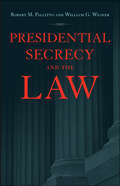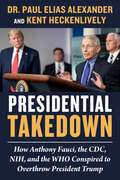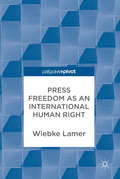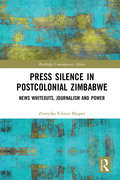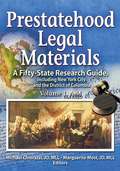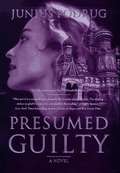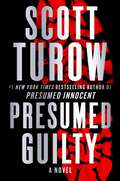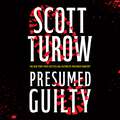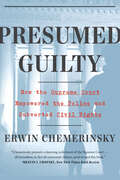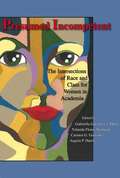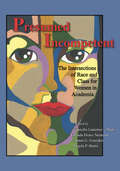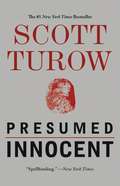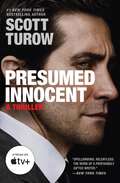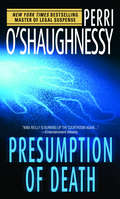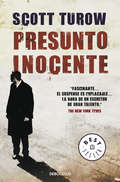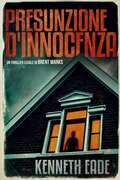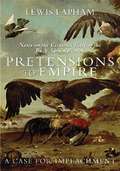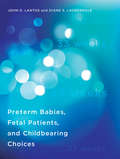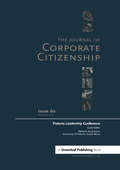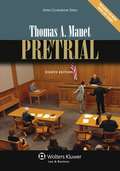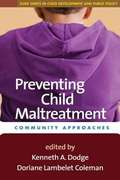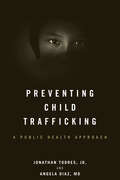- Table View
- List View
Presidential Powers
by Harold J KrentFramed in Article II of the Constitution, presidential powers are dictated today by judicial as well as historical precedent. To understand the ways the president wields power as well as how this power is kept in check by other branches of government, Harold J. Krent presents three overlapping determinants of the president's role under the Constitution-the need for presidential initiative in administering the law and providing foreign policy leadership, the importance of maintaining congressional control over policymaking, and the imperative to ensure that the president be accountable to the public.Krent’s examination is sweeping, ranging from the president's ability to appoint and remove executive branch officials, to the president's role in proposing and implementing treaties and the power to conduct war, to the extent the president can refuse to turn over information in response to congressional and judicial requests. Finally, Krent addresses the history and purposes of presidential pardons.By drawing on historic and contemporary presidential actions to illustrate his points, Krent reminds us that the president is both an exalted leader with the regalia of power and an American who is and should be accountable to fellow citizens-important considerations as we elect and assess our presidents.
Presidential Secrecy and the Law
by Robert M. Pallitto William G. WeaverAs seen on The Daily Show, July 24State secrets, warrantless investigations and wiretaps, signing statements, executive privilege—the executive branch wields many tools for secrecy. Since the middle of the twentieth century, presidents have used myriad tactics to expand and maintain a level of executive branch power unprecedented in this nation’s history. Most people believe that some degree of governmental secrecy is necessary. But how much is too much? At what point does withholding information from Congress, the courts, and citizens abuse the public trust? How does the nation reclaim rights that have been controlled by one branch of government?With Presidential Secrecy and the Law, Robert M. Pallitto and William G. Weaver attempt to answer these questions by examining the history of executive branch efforts to consolidate power through information control. They find the nation’s democracy damaged and its Constitution corrupted by staunch information suppression, a process accelerated when "black sites," "enemy combatants," and "ghost detainees" were added to the vernacular following the September 11, 2001, terror strikes.Tracing the current constitutional dilemma from the days of the imperial presidency to the unitary executive embraced by the administration of George W. Bush, Pallitto and Weaver reveal an alarming erosion of the balance of power. Presidential Secrecy and the Law will be the standard in presidential powers studies for years to come.
Presidential Secrecy and the Law
by Robert M. Pallitto William G. WeaverA look at how U.S. presidents from Truman to George W. Bush employed secrecy and how it has affected the presidency and the American government.State secrets, warrantless investigations and wiretaps, signing statements, executive privilege?the executive branch wields many tools for secrecy. Since the middle of the twentieth century, presidents have used myriad tactics to expand and maintain a level of executive branch power unprecedented in this nation’s history.Most people believe that some degree of governmental secrecy is necessary. But how much is too much? At what point does withholding information from Congress, the courts, and citizens abuse the public trust? How does the nation reclaim rights that have been controlled by one branch of government?With Presidential Secrecy and the Law, Robert M. Pallitto and William G. Weaver attempt to answer these questions by examining the history of executive branch efforts to consolidate power through information control. They find the nation’s democracy damaged and its Constitution corrupted by staunch information suppression, a process accelerated when “black sites,” “enemy combatants,” and “ghost detainees” were added to the vernacular following the September 11, 2001, terror strikes.Tracing the current constitutional dilemma from the days of the imperial presidency to the unitary executive embraced by the administration of George W. Bush, Pallitto and Weaver reveal an alarming erosion of the balance of power. Presidential Secrecy and the Law will be the standard in presidential powers studies for years to come.“The well-organized and clearly written book illustrates the way the president’s use of document classification and state-secrets privilege to solidify presidential control are reinforced by legal decisions sympathetic to presidential power.” —Chronicle of Higher Education
Presidential Takedown: How Anthony Fauci, the CDC, NIH, and the WHO Conspired to Overthrow President Trump
by Kent Heckenlively Dr. Paul Elias AlexanderAn explosive behind-the-scenes look at Donald Trump's final months in office and how the COVID crisis response was a carefully crafted plan to ruin him.In January 2020, Donald Trump was on the fast track to an easy re-election. While his first two years had been stymied by House Speaker Paul Ryan, Senate Majority Leader Mitch McConnell, and the Democrats, his third year had been one of remarkable success. The United States had low unemployment and was making strides across the globe. The president's rallies were well-attended, and he was being projected to win four hundred electoral votes and about forty-five states. Then came COVID-19.Dr. Paul Elias Alexander, former Senior Advisor to COVID Pandemic policy in the US government for President Trump and former COVID Pandemic evidence-synthesis advisor to WHO-PAHO, was on the frontlines to watch how Trump's world, and his reelection hopes, slowly collapsed leading up to November 2020—due to the CDC, NIH, and WHO conspiring to overthrow him with the worst response possible to the COVID crisis.Supported by emails and documents, career epidemiologist Alexander and New York Times-bestselling author Kent Heckenlively, JD, will not only show proof of a presidential takedown, but also of the personal vendetta of the CDC and HHS against Alexander himself. From unnecessary lockdowns, school closures, and mask mandates to the dismissal of effective treatments like hydroxychloroquine, ivermectin, and vitamin D and even threats against President Trump and his family, Presidential Takedown: How Anthony Fauci, the CDC, NIH, and the WHO Conspired to Overthrow President Trump is the inside story of what really happened from those first COVID-19 reports to President Trump's "loss" in November.
Press Freedom as an International Human Right
by Wiebke LamerThis book examines why press freedom has not become part of the established international human rights debate, despite its centrality to democratic theory. It argues that an unrestricted press is not just an important economic actor, but also an influential power in the political process, a status that interferes with government interests of sustaining their own power and influence. Despite the popularity of ideational explanations in the field of human rights studies, in the case of promoting press freedom, considerations of power and strategic interests rather than ideas dominate state behavior. The author makes the case that the current place of press freedom in the human rights debate needs to be rethought not only in developing countries, but in liberal democracies as well.
Press Silence in Postcolonial Zimbabwe: News Whiteouts, Journalism and Power (Routledge Contemporary Africa)
by Zvenyika Eckson MugariThis book focuses on news silence in Zimbabwe, taking as a point of departure the (in)famous blank spaces (whiteouts) which newspapers published to protest official censorship policy imposed by the Rhodesian government from the mid-1960s to the end of that decade. Based on archived news content, the author investigates the cause(s) of the disappearance of blank spaces in Zimbabwe’s newspapers and establishes whether and how the blank spaces may have been continued by stealth and proposes a model of doing journalism where news is inclusive, just and less productive of blank spaces. The author explores the broader ramifications of news silences, tacit or covert on society’s sense of the world and their place in it. It questions whether and how news media continued with the practice of epistemic deletions and continue to draw on the colonial archive for conceptual maps with which to define and interpret contemporary postcolonial realities and challenges in Zimbabwe. This book will be of interest to scholars, researchers and academics researching the press in contemporary Africa, critical media analysis, media and society studies, and news as discourse.
Prestatehood Legal Materials: A Fifty-State Research Guide, Including New York City and the District of Columbia, Volumes 1 & 2 (Law Librarianship Ser.)
by Michael Chiorazzi Marguerite MostExplore the controversial legal history of the formation of the United StatesPrestatehood Legal Materials is your one-stop guide to the history and development of law in the U.S. and the change from territory to statehood. Unprecedented in its coverage of territorial government, this book identifies a wide range of available resources from each state to reveal the underlying legal principles that helped form the United States. In this unique publication, a state expert compiles each chapter using his or her own style, culminating in a diverse sourcebook that is interesting as well as informative.In Prestatehood Legal Materials, you will find bibliographies, references, and discussion on a varied list of source materials, including: state codes drafted by Congress county, state, and national archives journals and digests state and federal reports, citations, surveys, and studies books, manuscripts, papers, speeches, and theses town and city records and documents Web sites to help your search for more information and morePrestatehood Legal Materials provides you with brief overviews of state histories from colonization to acceptance into the United States. In this book, you will see how foreign countries controlled the laws of these territories and how these states eventually broke away to govern themselves. The text also covers the legal issues with Native Americans, inter-state and the Mexico and Canadian borders, and the development of the executive, legislative, and judicial branches of state government.This guide focuses on materials that are readily available to historians, political scientists, legal scholars, and researchers. Resources that assist in locating not-so-easily accessible materials are also covered. Special sections focus on the legal resources of colonial New York City and Washington, DC—which is still technically in its prestatehood stage. Due to the enormity of this project, the editor of Prestatehood Legal Materials created a Web page where updates, corrections, additions and more will be posted.
Presumed Guilty
by Junius PodrugA woman's attempts to solve her mother's murder in Russia wind up getting her accused of the crime in this courtroom thriller.
Presumed Guilty (Presumed Innocent)
by Scott TurowRead Scott Turow&’s new &“unputdownable&” courtroom drama from the #1 New York Times bestselling author of Presumed Innocent, the phenomenon that redefined the legal thriller and is the basis for Apple TV+&’s most-watched drama series ever (Kristin Hannah, #1 NYT bestselling author). &“No one does it better.&”―David Baldacci, #1 NYT Bestselling Author &“The truth is, Turow is just better at this than the rest of us.&”―Greg Iles, #1 NYT Bestselling Author &“This is manna for legal-thriller fans."―Booklist, starred review &“This easily ranks among Turow&’s best."―Publishers Weekly, starred review &“An absorbing and entertaining read.&” ―Kirkus Rusty is a retired judge attempting a third act in life with a loving soon-to-be wife, Bea, with whom he shares both a restful home on an idyllic lake in the rural Midwest and a plaintive hope that this marriage will be his best, and his last. But the peace that&’s taken Rusty so long to find evaporates when Bea&’s young adult son, Aaron, living under their supervision while on probation for drug possession, disappears. If Aaron doesn&’t return soon, he will be sent back to jail. Aaron eventually turns up with a vague story about a camping trip with his troubled girlfriend, Mae, that ended in a fight and a long hitchhike home. Days later, when she still hasn&’t returned, suspicion falls on Aaron, and when Mae is subsequently discovered dead, Aaron is arrested and set for trial on charges of first-degree murder. Faced with few choices and even fewer hopes, Bea begs Rusty to return to court one last time, to defend her son and to save their last best hope for happiness. For Rusty, the question is not whether to defend Aaron, or whether the boy is in fact innocent—it&’s whether the system to which he has devoted his life can ever provide true justice for those who are presumed guilty.
Presumed Guilty (Presumed Innocent, 3)
by Scott TurowIn a sequel to Presumed Innocent, the book that redefined the legal thriller, judge and lawyer Rusty Sabich returns to the courtroom to defend his step-son against a racially-charged murder indictment as the boy's life-and perhaps Rusty's last chance at happiness-hang in the balance.Rusty is a retired judge attempting a third act in life with a loving soon-to-be wife, Bea, with whom he shares both a restful home on an idyllic lake in the rural Midwest and a plaintive hope that this marriage will be his best, and his last. But the peace that's taken Rusty so long to find evaporates when Bea's young adult son, Aaron, living under their supervision while on probation for drug possession, disappears. If Aaron doesn't return soon, he will be sent back to jail.Aaron eventually turns up with a vague story about a camping trip with his troubled girlfriend, Mae, that ended in a fight and a long hitchhike home. Days later, when she still hasn't returned, suspicion falls on Aaron, and when Mae is subsequently discovered dead, Aaron is arrested and set for trial on charges of first degree murder.Faced with few choices and even fewer hopes, Bea begs Rusty to return to court one last time, to defend her son and to save their last best hope for happiness. For Rusty, the question is not whether to defend Aaron, or whether the boy is in fact innocent-it's whether the system to which he has devoted his life can ever provide true justice for those who are presumed guilty.
Presumed Guilty: How The Supreme Court Empowered The Police And Subverted Civil Rights
by Erwin ChemerinskyAn unprecedented work of civil rights and legal history, Presumed Guilty reveals how the Supreme Court has enabled racist policing and sanctioned law enforcement excesses through its decisions over the last half-century. Police are nine times more likely to kill African-American men than they are other Americans—in fact, nearly one in every thousand will die at the hands, or under the knee, of an officer. As eminent constitutional scholar Erwin Chemerinsky powerfully argues, this is no accident, but the horrific result of an elaborate body of doctrines that allow the police and, crucially, the courts to presume that suspects—especially people of color—are guilty before being charged. Today in the United States, much attention is focused on the enormous problems of police violence and racism in law enforcement. Too often, though, that attention fails to place the blame where it most belongs, on the courts, and specifically, on the Supreme Court. A “smoking gun” of civil rights research, Presumed Guilty presents a groundbreaking, decades-long history of judicial failure in America, revealing how the Supreme Court has enabled racist practices, including profiling and intimidation, and legitimated gross law enforcement excesses that disproportionately affect people of color. For the greater part of its existence, Chemerinsky shows, deference to and empowerment of the police have been the modi operandi of the Supreme Court. From its conception in the late eighteenth century until the Warren Court in 1953, the Supreme Court rarely ruled against the police, and then only when police conduct was truly shocking. Animating seminal cases and justices from the Court’s history, Chemerinsky—who has himself litigated cases dealing with police misconduct for decades—shows how the Court has time and again refused to impose constitutional checks on police, all the while deliberately gutting remedies Americans might use to challenge police misconduct. Finally, in an unprecedented series of landmark rulings in the mid-1950s and 1960s, the pro-defendant Warren Court imposed significant constitutional limits on policing. Yet as Chemerinsky demonstrates, the Warren Court was but a brief historical aberration, a fleeting liberal era that ultimately concluded with Nixon’s presidency and the ascendance of conservative and “originalist” justices, whose rulings—in Terry v. Ohio (1968), City of Los Angeles v. Lyons (1983), and Whren v. United States (1996), among other cases—have sanctioned stop-and-frisks, limited suits to reform police departments, and even abetted the use of lethal chokeholds. Written with a lawyer’s knowledge and experience, Presumed Guilty definitively proves that an approach to policing that continues to exalt “Dirty Harry” can be transformed only by a robust court system committed to civil rights. In the tradition of Richard Rothstein’s The Color of Law, Presumed Guilty is a necessary intervention into the roiling national debates over racial inequality and reform, creating a history where none was before—and promising to transform our understanding of the systems that enable police brutality.
Presumed Incompetent
by Yolanda Flores Niemann Angela P. Harris Gabriella Gutiérrez y Muhs Carmen G. GonzálezPresumed Incompetent is a pathbreaking account of the intersecting roles of race, gender, and class in the working lives of women faculty of color. Through personal narratives and qualitative empirical studies, more than 40 authors expose the daunting challenges faced by academic women of color as they navigate the often hostile terrain of higher education, including hiring, promotion, tenure, and relations with students, colleagues, and administrators. The narratives are filled with wit, wisdom, and concrete recommendations, and provide a window into the struggles of professional women in a racially stratified but increasingly multicultural America.
Presumed Incompetent: The Intersections of Race and Class for Women in Academia
by Yolanda Flores Niemann Angela P. Harris Gabriella Gutiérrez y Muhs Carmen G. GonzálezPresumed Incompetent is a pathbreaking account of the intersecting roles of race, gender, and class in the working lives of women faculty of color. Through personal narratives and qualitative empirical studies, more than 40 authors expose the daunting challenges faced by academic women of color as they navigate the often hostile terrain of higher education, including hiring, promotion, tenure, and relations with students, colleagues, and administrators. The narratives are filled with wit, wisdom, and concrete recommendations, and provide a window into the struggles of professional women in a racially stratified but increasingly multicultural America.
Presumed Innocent
by Scott TurowHailed as the most suspenseful and compelling novel in decades, PRESUMED INNOCENT brings to life our worst nightmare: that of an ordinary citizen facing conviction for the most terrible of all crimes. It's the stunning portrayal of one man's all-too-human, all-consuming fatal attraction for a passionate woman who is not his wife, and the story of how his obsession puts everything he loves and values on trial--including his own life. It's a book that lays bare a shocking world of betrayal and murder, as well as the hidden depths of the human heart. And it will hold you and haunt you...long after you have reached its shattering conclusion.
Presumed Innocent: A Novel (Presumed Innocent)
by Scott TurowNOW AN APPLE ORIGINAL SERIES FROM APPLE TV+ STARRING JAKE GYLLENHAALFrom #1 New York Times bestselling author and hailed as the most suspenseful and compelling novel in decades, this story brings to life our worst nightmare: that of an ordinary citizen facing conviction for the most terrible of all crimes. Rusty Sabich, family man and the number-two prosecutor of Kindle County, is handed an explosive case--the brutal murder of a woman who happens to be his former lover. A shocking turn of events suddenly transforms him from the accuser into the accused... and plunges him into a nightmare world where nothing seems real and no one can be PRESUMED INNOCENT. It's the stunning portrayal of one man's all-too-human, all-consuming fatal attraction for a passionate woman who is not his wife, and the story of how his obsession puts everything he loves and values on trial--including his own life. It's a book that lays bare a shocking world of betrayal and murder, as well as the hidden depths of the human heart. And it will hold you and haunt you...long after you have reached its shattering conclusion.
Presumption of Death (Nina Reilly)
by Perri O'ShaughnessyNew York Times bestselling author Perri O’Shaughnessy has garnered impressive acclaim for her tough, passionate thrillers set against the lush Lake Tahoe landscape and the world of one remarkable character: Attorney Nina Reilly. In this spellbinding new novel, O’Shaughnessy delves deeper into the heart and psyche of her popular heroine as Nina journeys back to her hometown to heal old wounds, and instead discovers that old secrets can be the deadliest kind....Nina Reilly needs a fresh start. In three years, she’s taken on some of Lake Tahoe’s most controversial cases and has turned her struggling one-woman law firm into a thriving practice. Now she’s ready to sort out her complex relationship with her boyfriend, Monterey P.I. Paul van Wagoner. So she’s heading to the Carmel Valley, the place where she began her career and where her estranged father lives. It’s also a place of dramatic contradictions and hidden tensions, of new wealth and old families. And, within days of her arrival, Nina is already feeling the heat, as a case of arson exposes some of the darkest secrets of her hometown. Two suspicious fires have already raged through the valley this summer, igniting suspicions of arson. When a third blaze ends in a fatality, police zero in on a suspect: Wish, the son of Sandy Whitefeather, Nina’s ex-assistant. The dead man is identified as Wish’s childhood friend, a troubled local auto mechanic who hated the changes wealthy newcomers had brought to the valley. Nina and Paul are certain that there is more to this strange case than meets the eye. As they work together to clear Wish, new, more frightening questions are raised, and another fire is set. And out of the flames a terrifying picture emerges: a community steeped in secrets and rage, a tangled history between two men, and a killer whose motives are dark and wrenching. With the relentless page-turning suspense that has become her trademark, Perri O’Shaughnessy once again demonstrates her talent to enthrall. A haunting tale of crime and punishment, old grudges and second chances, Presumption of Death is suspense fiction at its finest--instantly compelling and utterly impossible to put down.
Presumption of Guilt
by Lelia KellyDynamic Atlanta lawyer Laura Chastain has developed a hard-earned reputation for waging uncompromising courtroom battles, inciting tabloid headlines, and making enemies on both sides of the law. But now, she's about to plunge straight into the heart of Atlanta's most controversial trial: defending an unscrupulous white cop indicted for killing a black suspect held in custody. Laura soon learns, however, that the case isn't as simple as the charge.
Presunto inocente
by Scott Turow¿Quién mató a Carolyn Polhemus? La enérgica, fascinante, sensual y ambiciosa ayudante del fiscal general, Raymond Horgan, ha sido violada y asesinada casi al final de la campaña de su jefe por la reelección. Horgan necesita que el crimen sea esclarecido lo antes posible y para conseguirlo confía las investigaciones del caso a Rusty Sabich, un reputado miembro de su oficina. Lo que Horgan desconoce es que, pocos meses antes del asesinato, Carolyn y Rusty eran amantes. Sabich es un hombre melancólico, apasionado y, sobre todo, solitario. En la frontera de los cuarenta, se ha dado cuenta de que su matrimonio y su carrera se han estancado, y ha volcado sus sentimientos en su hijo Nat, y en la angustiosa fantasía vivida con Carolyn, un romance que ella rompió sin dar explicaciones. El desarrollo de las investigaciones llena a Sabich de recuerdos y obsesiones, y, lejos de descubrirle al asesino, le envuelve en una nebulosa donde nadie es del todo inocente. Scott Turow refleja en esta novela un mundo tan similar al nuestro que su recuerdo seguirá obsesionando al lector incluso después de resuelto el misterio, porque muy pocas novelas muestran los mecanismos, la psicología, la lógica del mundo de la justicia con tanta verosimilitud como Presunto inocente. «Después de dos días de leer sin parar, acabé la novela de Scott Turow sintiéndome agotado, estimulado y triste por haberla terminado. Presunto inocente es una de las novelas más cautivadoras que he leído desde hace mucho tiempo.» PAT CONROY
Presunzione d'innocenza: Un Thriller Legale di Brent Marks
by Kenneth EadeLa presidente della Associazione dei proprietari immobiliari di Orange Grove viene assassinata e ci sono molti sospetti: in effetti tutti quelli che vivono in quello che un tempo era un aranceto sono potenziali colpevoli. L'avvocato Brent Marks pensa di avere a che fare con una normale causa di pignoramento, fino a quando la sua cliente non viene implicata nel crimine e chiede a Brent di difenderla. A peggiorare le cose, il destino di un altro cliente sta per incrociare la sua strada. Chi sta difendendo Brent? Una cliente innocente o colpevole? Al crocevia tra morale ed etica, esplode il dramma nell'aula, mentre l'azione al di fuori dell'aula di tribunale è totalmente fuori controllo. Acclamato dalla critica "HOA Wire intreccia con successo crimine e aula di tribunale, tanto che la conclusione inaspettata arriva sia come un risultato logico e di successo, che come una vera e propria sorpresa. Con i suoi approfondimenti concreti sui processi HOA e sulle controversie tra vicini, HOA Wire è un'abile esplorazione dell'etica che unisce il rapporto avvocato-cliente, coniugando perfettamente narrazione criminale/aula di tribunale." -Midwest Book Review "HOA Wire di Kenneth Eade è un ottimo libro, scritto da un avvocato. Una combinazione di dramma giudiziario e crimine. Un colpo di scena dietro l'altro si susseguono e la narrazione si trasforma, terminando in un finale davvero sorprendente. È una storia intrigante, che va in una direzione diversa ad ogni angolo." -Reader's Favorite "Crimine, tradimento, domande stimolanti legate all'etica e alla moralità: questo romanzo ha tutto ciò di cui ha bisogno per diventare un must per ogni amante della vera letteratura criminale." -Top Books Worth Reading “HOA Wire è molto più di un romanzo poliziesco, pieno di suspense e dal ritmo serrato: è un dramma giudiziario che ricorderà ai lettori i thriller pulp e li terrà incollati alle pagine. Eade è brillante quando s
Pretensions to Empire: Notes on the Criminal Folly of the Bush Administration
by Lewis LaphamLapham stands virtually alone among mainstream American journalists in having consistently seen through the fog of lies and narcissism surrounding the Bush administration from its earliest days in Washington.
Preterm Babies, Fetal Patients, and Childbearing Choices (Basic Bioethics)
by John D. Lantos Diane S. LauderdaleWhy preterm birth rates in the United States remain high even as access to prenatal care has improved and infant mortality has steadily dropped.The United States has one of the highest rates of premature birth of any industrialized nation: 11.5%, nearly twice the rate of many European countries. In this book, John Lantos and Diane Lauderdale examine why the rate of preterm birth in the United States remains high—even though more women have access to prenatal care now than three decades ago. They also analyze a puzzling paradox: why, even as the rate of preterm birth rose through the 1990s and early 2000s, the rate of infant mortality steadily decreased.Lantos and Lauderdale explore both the medical practices that might give rise to these trends as well as some of the demographic changes that have occurred over these years. American women now delay childbearing, for example, and have fewer babies. Doctors are better able to monitor fetal health and well-being. Prenatal care has changed, no longer focusing solely on the health of the pregnant woman. Today, the fetus has become a patient, and many preterm births are medically induced because of concern for the well-being of the fetus. Preterm birth is no longer synonymous with a bad outcome. Sometimes, it is necessary for a good one.
Pretoria Leadership Conference: A special theme issue of The Journal of Corporate Citizenship (Issue 60)
The Albert Luthuli Centre for Responsible Leadership invited papers related to responsible leadership from a trans-disciplinary perspective involving the social and natural sciences. Subsequent to a lengthy review process, fifteen authors were invited to present at the the 3rd International Conference on Responsible Leadership; from these, five papers were finally selected to appear in this Special Edition.Management, leadership, and business knowledge by itself cannot ensure a sustainable and equitable future. What is needed is an integration of knowledge about responsible leadership across disciplinary boundaries, ranging from management studies and the physical sciences, to law, the humanities and social science. Only by integrating across current disciplinary boundaries can we find hope for generating what has been termed “earth system governance”, a way for humanity to manage the complexities of the world to create a just, equitable, and sustainable world for all.The five papers included in this special edition provide insight into responsible leadership and the importance of interdisciplinary dialogue in an interconnected and complex world. The perspectives converge to give us focused insights on responsible leadership as an emerging discourse, confirming the importance of bridging science, business and politics, and the role that responsible leadership plays in this.
Pretrial (Eighth Edition)
by Thomas A. MauetPretrial achieved leading stature through its clear, concise,well-organized presentation of pretrial preparation by one of the country's leading experts on trial techniques. An effective systematic approach organizes pretrial planning and preparation into a series ofdistinct steps students can readily master. Litigation files from ahypothetical case, complete with sample documentation and paperwork,take students through each stage of a civil case. (Aspen Coursebook Series)
Preventing Child Maltreatment
by Doriane Coleman Kenneth DodgeMany child abuse prevention programs have targeted factors within the family, such as parenting skills. This book describes the next wave of prevention the promotion of safer, healthier childrearing environments in entire communities. The contributors are leading authorities who illuminate how contextual factors including poverty, chaotic neighborhoods, and lack of social supports combine with family factors to place children at risk for maltreatment. They present a range of exemplary programs designed to strengthen communities while also helping individual parents to meet their children's needs. Real-world evaluation approaches, quality-control strategies, and policy implications are discussed in depth.
Preventing Child Trafficking: A Public Health Approach
by Jonathan Todres Angela DiazHow can a public health approach advance efforts to prevent, identify, and respond to child trafficking?Child trafficking is widely recognized as one of the critical issues of our day, prompting calls to action at the global, national, and local levels. Yet it is unclear whether the strategies and tools used to counter this exploitation—most of which involve law enforcement and social services—have actually reduced the prevalence of trafficking. In Preventing Child Trafficking, Jonathan Todres and Angela Diaz explore how the public health field can play a comprehensive, integrated role in preventing, identifying, and responding to child trafficking. Describing the depth and breadth of trafficking's impact on children while exploring the limitations in current responses, Todres and Diaz argue that public health frameworks offer important insights into the problem, with detailed chapters on how professionals and organizations can identify and respond effectively to at-risk and trafficked children. Drawing on the authors' years of experience working on this issue—Diaz is a doctor at a frontline medical center serving at-risk youth, victims, and survivors; Todres is a legal expert on legislative and policy initiatives to address child trafficking—the book maps out a public health approach to child trafficking, the role of the health care sector, and the prospects for building a comprehensive response. Providing readers with advice geared toward better understanding trafficking's root causes, this revelatory book concludes by mapping out a "public health toolkit" that can be used by anyone who is interested in preventing child trafficking, from policymakers to professionals who work with children.

